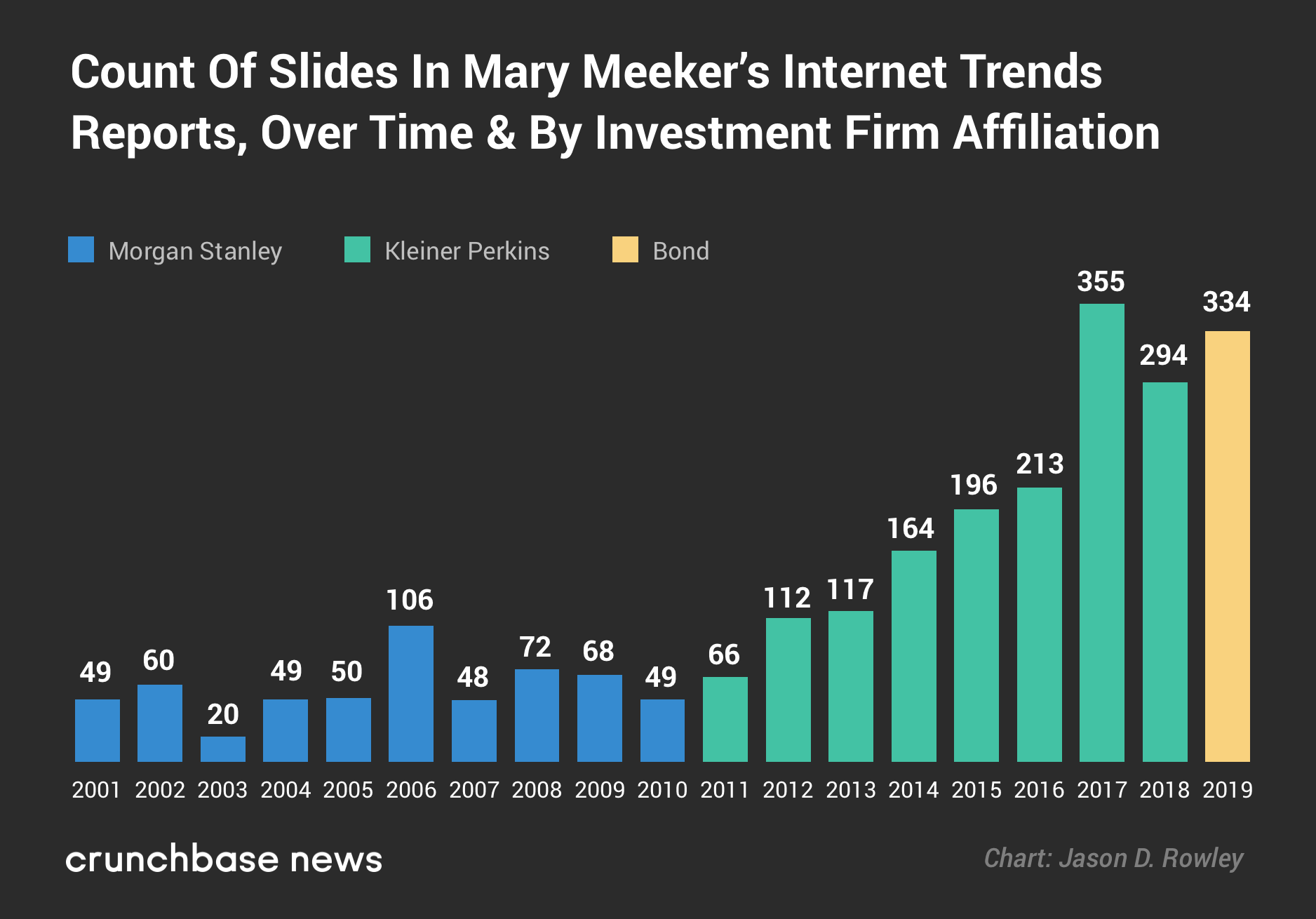It’s early June, and you know what that means, don’t you? Fun in the sun? Ice cream? First jaunts to the beach? Sure, all of those things. But for followers of the drifts and shifts in web tech and the businesses built upon it, today is tantamount to Christmas.
Subscribe to the Crunchbase Daily
It’s Internet Trends Report Day! If you just want to see the slides, check ‘em out below, or view the document directly on the Bond Capital website. An archive of previous reports can also be found on Bond’s website. (Thanks to Kate Clark at TechCrunch for uploading the document to Scribd.)
Internet Trends 2019 by on Scribd
Here’s some of what we gathered from a quick skim of the report:
- Over half the world’s population has some connection to the Internet. However, adoption of smartphones, a major catalyst of Internet adoption over the past decade, may be plateauing, with new phone shipments declining for the second consecutive year.
- Countries in Africa, the Middle East, and the Asia-Pacific region are the last markets where Internet adoption remains below 50 percent. Accordingly, revenue and market capitalization growth among the world’s largest tech companies is starting to slow, likely exacerbated by recent geopolitical unease.
- As a percent of U.S. retail, e-commerce now accounts for 15 percent of total spending. Powering that is online advertising, which has experienced a dramatic shift in spending from desktop to mobile, as we all spend more time with our handheld devices.
- Google and Facebook still dominate online advertising, but relative underdogs like Amazon, Twitter, Pinterest, and Snap are accelerating revenue growth. Despite an abundance of advertising platforms and better targeting capabilities, the cost of converting folks into app users is also on the rise, which may not be sustainable.
- Digital media like streaming video and podcast-listening are taking up more of our time, and time spent on mobile devices finally eclipsed TV. Over a quarter of U.S. adults are now online “almost constantly,” up from 21 percent three years ago.
- Social media continues to be a megaphone, which carries its ups and downsides. Major platform providers are upping their efforts to moderate incendiary and unpalatable content; despite these efforts, overall belief that the Internet is good for society is on the decline. And so is global Internet freedom.
- The Internet is also changing the ebbs and flows of supply and demand. In America, there are now millions of people supplying labor to gig-economy digital work platforms, and millions more consumers demanding these services.
Meeker (and whomever else helps to put this slide deck together) cites all statistics with their sources at the bottom of each slide.
At 334 slides in total, Mary Meeker’s 2019 presentation on Internet trends is the second longest to date. Slide counts in this report is a sort of meta-trend we at Crunchbase News covered in June 2018 and 2017. 2019’s is the first such report Meeker released since launching her new late-stage venture firm, Bond Capital, after many years at Kleiner Perkins.

Unfamiliar with the Internet Trends Report and the person behind it? Here’s the low-down.
Mary Meeker is a venture capital investor with a lot of successful investments under her belt. Some folks refer to her as “queen of the Internet,” a title bestowed upon her in the early days of the WWW, when she was a research analyst at Morgan Stanley. In 1995, she and a colleague from Morgan Stanley published the first of what would become an annual series of reports about, well, the Internet.
Ergo “The Internet Trends Report.”
Fast forward past the bust of the first Dot Com bubble to 2010, when Meeker departed Morgan Stanley to join Kleiner Perkins. According to Wall Street Journal coverage from the time, “Ms. Meeker and KPCB go back nearly two decades, having first worked together on the 1993 initial public offering of software company Intuit Inc., which was funded by KPCB and taken public by Morgan Stanley.” Meeker also served as principal analyst for the investment bank during Google’s IPO in 2004. John Doerr, a partner at Kleiner Perkins, was on the board of Google, another connection.
At Kleiner Perkins, Meeker represented the firm in its late-stage dealings with the likes of Slack, Stripe, Spotify, Airbnb, Uber, and others. Her last known deal with the firm was payment infrastructure provider Plaid’s Series C round, which was announced in December 2018.
As Crunchbase News covered at the time, Meeker’s Plaid deal was reportedly her last on behalf of Kleiner Perkins. Meeker announced in September 2018 that she would depart to start her own late-stage firm. In January 2019, reports surfaced that Meeker’s new firm would be called Bond Capital. In late April, the new firm said it had closed $1.25 billion for Bond’s first late-stage fund. Bond’s first reported investment was a $70 million Series D round raised by Australia-based web-first drag-and-drop design tool Canva.
To this day, Meeker’s reports anchor her influence on the world of tech and venture capital. Which is all to say that it pays to leave a paper trail, and that there’s fortune to be found in stacking the (slide) deck higher over time.

Stay up to date with recent funding rounds, acquisitions, and more with the Crunchbase Daily.




![Illustration of a guy watering plants with a blocked hose - Global [Dom Guzman]](https://news.crunchbase.com/wp-content/uploads/quarterly-global-3-300x168.jpg)
67.1K Followers